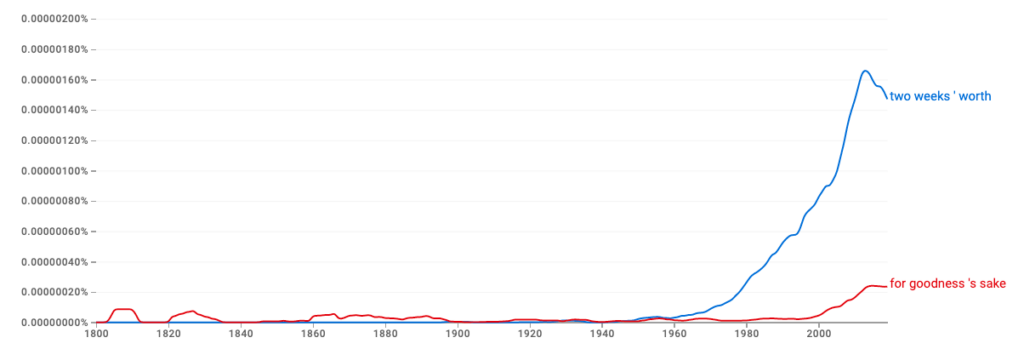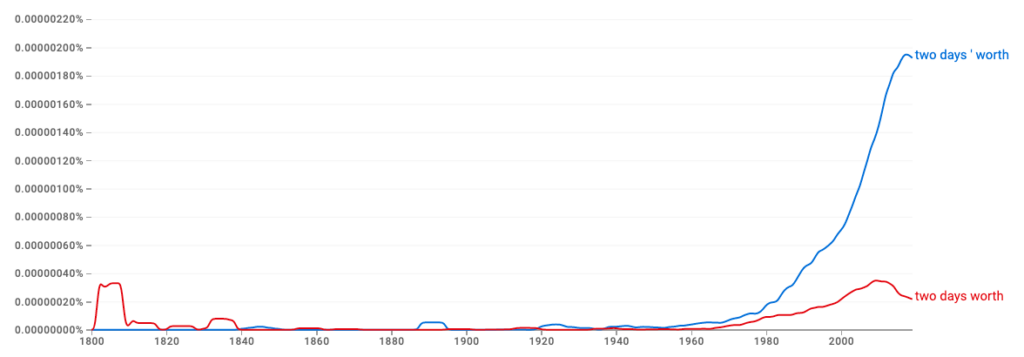In the past I have discussed the lack of guidelines for American editors, as well as the existence of zombie rules, both of which can sometimes make an editor’s job tedious and confusing. Once, I asked fellow editors what usage rule they wanted to know more about or what rule they saw broken regularly. I received lots of answers, including this one:
“Why is worth preceded with a possessive noun or pronoun, as in two days’ worth?”
We can include similar phrases in the question, such as for goodness’s sake. Can day or goodness possess something? What does it mean to possess sake? Let’s investigate.
Changing Terminology
The problem starts with our understanding of what we use the apostrophe for and what possession is. This misunderstanding isn’t new; it begins with 18th-century grammarians (yes, those gents again).
The term possessive was introduced into the grammar lexicon by Bishop Robert Lowth in 1762 in A Short Introduction to English Grammar. Lowth used it to replace the older term, genitive:
The relation of Possession, or Belonging, is often expressed by a Case, or a different ending of the Substantive. This case answers to the Genitive Case in Latin, and may still be so called; though perhaps more properly the Possessive Case. Thus, “God’s grace :” which may also be expressed by the Preposition ; as, “the grace of God.” It was formerly written Godis grace : we now very improperly always shorten it with an Apostrophe, even though we are obliged to pronounce it fully ; as, “ Thomas’s book :” that is, “ Thomasis book “ not “ Thomas his book,” as it is commonly supposed.
Other grammarians and language commentators did the same, and collectively we soon forgot that the genitive is about more than possession.
Losing the Broader View
Longman’s Grammar of Spoken and Written English divides the genitive into specifying genitives (e.g., possession, as in Thomas’s book) and classifying genitives, two of which are the genitive of time (a summer’s day) and the genitive of measure (two weeks’ worth). Instead of “whose …?” classifying genitives commonly answer the question “what kind of …?”
Longman’s notes that classifying genitives are more closely related to adjectives than determiners (e.g., the). According to the text, a classifying genitive:
- Can’t be replaced by a possessive determiner: children’s clothing department vs. their clothing department
- Can follow a determiner and whole-phrase modifiers: the children’s department, Sears’s children’s department
- Forms a unit with the noun that follows it, preventing an adjective from coming between them: a large children’s department vs. a children’s large department
- Is often rewritten as a for phrase rather than an of phrase: department for children vs. department of children
Because those early grammarians switched from using genitive to possessive, they got into the mindset that possession was the genitive case. That led to rules like “Don’t attribute possession to something inanimate.” Phrases such as two weeks’ worth and for goodness’s sake aren’t supposed to be possible. Yet there they are. In common usage.
Google Books records them to at least 1800:

Correcting Ourselves
Because we’ve narrowed our thinking of the genitive case to the possessive case, we often forget to use the apostrophe in such phrases as two days’ worth and for goodness’s sake. Longman’s prefers the view that language users are choosing between a genitive case and a common case: two days’ worth or two days worth.
Yet we generally don’t make this mistake with nouns that don’t already end in s:

It’s more likely that many language users don’t know the genitive is used for more than possession and aren’t clear on how to use an apostrophe, which I outlined in “Punctuation Point: Possessing the Apostrophe.” Options for how to use the apostrophe with a word that ends in /es/ muddy the waters further.
Whatever the reason for our errors, worth, sake, and related phrases do use an apostrophe to make what we commonly call a possessive case but what is actually another of the genitive cases. It’s correct to write:
“For goodness’s sake, I have two days’ worth of work to do after just one vacation day!”
A version of this article originally published in July 2014 on Visual Thesaurus.


